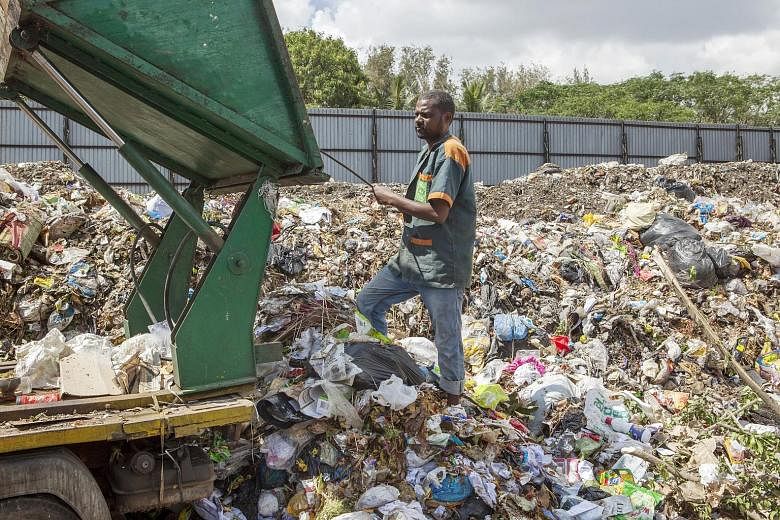NEW DELHI • It is 6.30am in the city of Mysuru and the streets are full of workers in olive green aprons and rubber gloves who have come to collect one of India's biggest untapped resources: garbage.
About one million citizens in the southern city, also known as Mysore, are in the vanguard of a campaign by Prime Minister Narendra Modi to clean up the country and recycle rubbish into compost and electricity. The task is gargantuan, but the approach in Mysuru shows how the country might overturn its image of ubiquitous trash.
India's cities are among the largest garbage generators in the world, producing about 62 million tonnes of waste every year. Only about 82 per cent of it is collected and only 28 per cent of that is treated and processed. Most goes into landfills, open dump sites or is just left on the ground, often clogging rivers and drains.
Cities that can find an economic way to deal with the issue could reap a windfall in terms of investment and the benefits of a healthier community. "We don't want waste to be waste; we want to get wealth out of it," says Mr D.G. Nagaraj, health officer of the Mysuru City Corporation. "Zero landfill is our motto."
As the morning whistle sounds in Mysuru, residents emerge from their homes with two bins - compostable and non-compostable - for the sanitary workers, who load up 400 push carts and 170 auto-tippers bound for nine recycling centres and a compost plant.
At the centres, the trash is segregated, with reusable items such as bottles, metal and footwear and plastic cups being sold to scrap dealers. The remainder is composted and sold to farmers.
-
62m
Tonnes of waste produced by India's cities every year. They are among the largest garbage generators in the world.
82%
Percentage of waste collected.
28%
Percentage of waste collected that is treated and processed. Most goes into landfills, open dump sites or is just left on the ground, often clogging rivers and drains.
Of the 402 tonnes of waste Mysuru produces each day, close to a quarter is processed by these centres and about half is treated at the compost plant. For the waste-to-fertiliser plant, Mysuru charges an annual fee and takes 5 per cent of the finished compost as payment.
It also collects a solid-waste management levy from residents, along with the property tax, to help subsidise the programme.
Like most nascent recycling systems, Mysuru's system depends partly on government support. The federal government last year began offering subsidies both to set up compost plants and to run them.
Before the central government grants, only about 70 per cent of the costs of the plant were covered by the sale of fertiliser. The incentives have helped boost the nation's production of compost from waste to 1.31 million tonnes in August from 150,000 tonnes in March 2016.
Investment in facilities to turn waste into compost or energy could reach US$3 billion (S$4 billion) by 2027, according to estimates by industry body Assocham in 2015.
Mr Modi's government has also made it mandatory for the electricity board to buy power from the country's seven existing waste-to-energy plants. Another 56 such generating plants are under construction, though Mysuru is too small to make such a plant viable for the city with the current infrastructure.
But stronger measures will be needed to get more people to adhere to the recycling programme.
To take the move forward, the corporation is planning to refuse to take unsegregated waste from residents, will ask citizens to have their own solid waste management units, and is in the process of setting up more processing units.
BLOOMBERG

